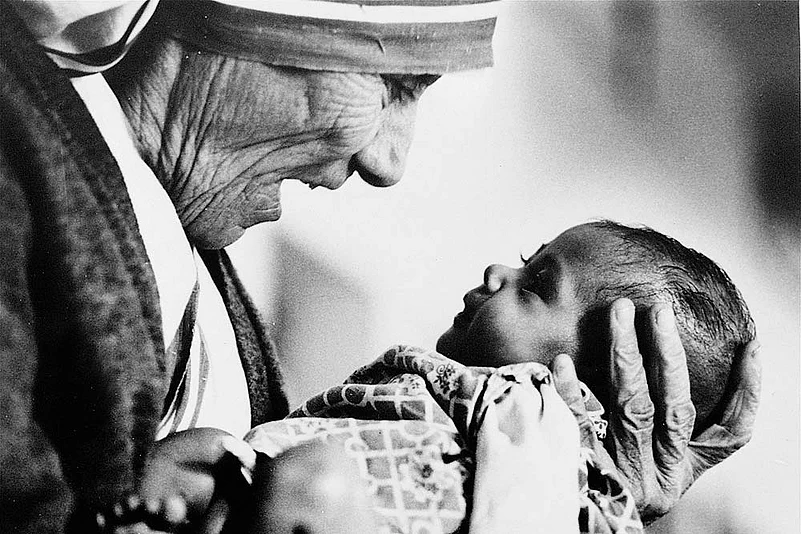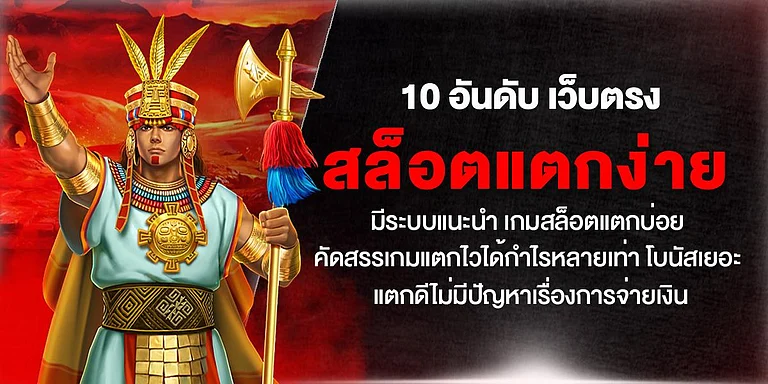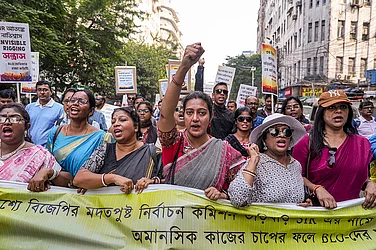Officially, Mother House, the central Calcutta home of Mother Teresa’s world-renowned philanthropy, Missionaries of Charity (MoC), has ‘accepted’ the new set of adoption guidelines issued by the Union ministry of women and child development.
Speaking to Outlook, MoC’s official spokesperson Sunita Kumar says, “I spoke to the sisters and they say that ‘maybe this (the new directives about adoption) is the will of God’. They are not resisting it.” Kumar points out that the MoC has neither ‘closed down’ its orphanages nor ‘withdrawn’ its adoption agencies as widely reported, but are “preparing to shift their adoption management to representatives of the ministry”.
“It has been erroneously claimed that the MoC has refused to comply. It has merely claimed that meeting the new guidelines would be ‘difficult’ for it and so the adoption procedure will (have to) be taken care of by the ministry. MoC will continue to look after children brought to the homes...,” Kumar says. She claims that the MoC is not particularly perturbed by the decision. “They are extremely straightforward and clear that this is a government decision and they will abide by it.”
What then is the controversy all about? After the Union ministry’s decision to uphold a new provision of the law allowing single men and women to adopt children, members of orthodox Christian institutions and Catholic churches, including the MoC—one of India’s most trusted adoption organisations—voiced their objections. Yet, though the MoC appears to have ‘accepted’ the decision and promises to ‘abide by’ them, insiders reveal a deep-seated anxiety about the children’s future that is brewing within the organisation.
“Whatever we say, we will be misunderstood,” says a nun, peering out of a half-open window at one of the 18 MoC adoption centres in Calcutta. She, like the other sisters, declines to comment officially on their position. Since August, when the government decision was first made public, it was believed that the charity would rather withdraw and gradually close down its orphanages and adoption centres than comply with the new set of adoption regulations. Because of this apparent unwillingness to accept the new provisions the MoC has come under fire from the Centre, with allegations ranging from religious dogma and homophobia to a disregard for a uniform legal code levelled against them.
But speak to the MoC nuns—strictly off the record—and at the core of the whole issue lies a story of compassion and a “deep fear that these hapless children would not lead happy futures if they do not have a ‘normal’ upbringing”.
One of them explains that there are several layers to this fear. “When we give a child away to a couple after careful scrutiny, the most important consideration for us is the child’s safety, security and happiness. First of all, we still live in a society in which having a father and a mother is considered the ‘normal’ course for a family. Even if death or divorce takes place, with a child losing a parent, he or she is traumatised. An orphan or an abandoned child is already a victim of misfortune. When we have the choice to give him or her a ‘normal’ future, why would we compromise on that?” Another “fear” relates to “child abuse”. She says. “This can occur anywhere—but the risk is perceived to be lower when there is a mother and father involved.”
In Calcutta, the MoC nuns’ observations find resonance amongst other families too. Says Sam Jay Raj, a Calcutta businessman, “A single man, for instance, maybe a wonderful human being in reality and possibly make a great father but you have to understand the adoption agency’s fears about giving a child away to a single man. For instance, I know I’m a great guy but how do others know that? It’s not fair on my part to demand that they give me a child, no matter how much I may want one. The pseudo-secularists who are criticising Mother Teresa’s charity should perhaps understand this.”
By Dola Mitra in Calcutta


























